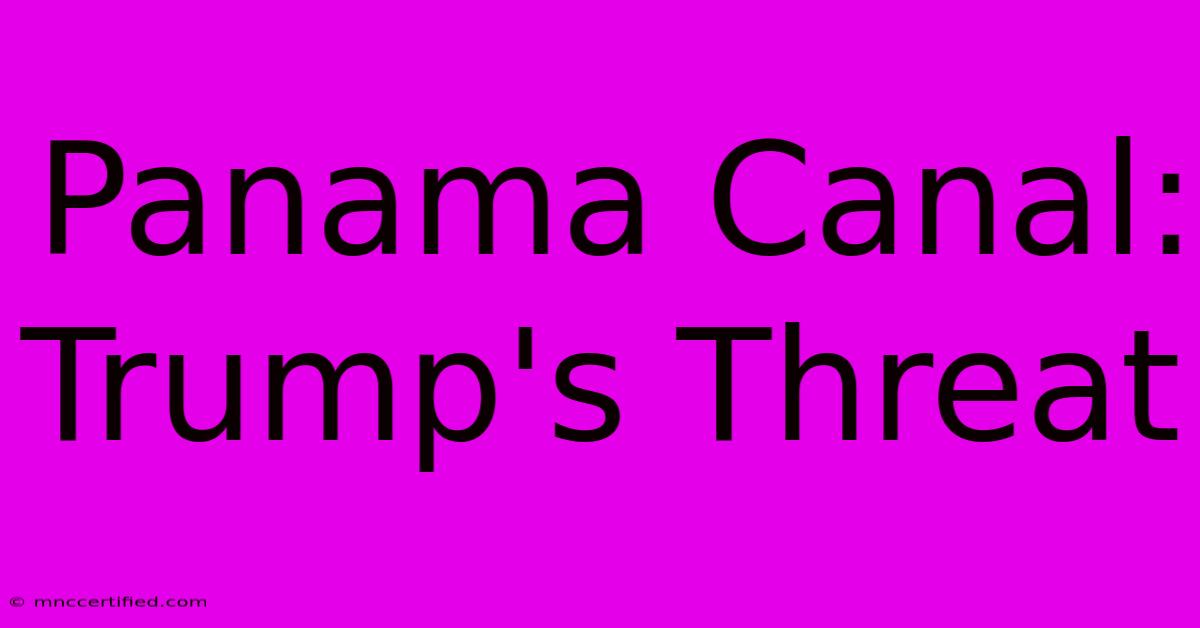Panama Canal: Trump's Threat

Table of Contents
Panama Canal: Trump's Threat – A Deep Dive into Geopolitical Tensions
The Panama Canal, a crucial artery of global trade, has often been at the center of geopolitical maneuvering. One particularly contentious period involved former President Donald Trump's administration and its pronouncements regarding the canal's operations and the United States' relationship with Panama. This article will delve into the specifics of Trump's perceived "threat" to the Panama Canal, examining the underlying factors, the reactions it provoked, and its lasting implications on international relations.
Understanding the Context: US Interests and Canal Control
The United States has a long and complex history with the Panama Canal. Its construction in the early 20th century, a feat of engineering and a testament to American power, was fraught with controversy, involving intervention in Panamanian affairs and a legacy of neocolonialism. Even after the transfer of control to Panama in 1999, the US retained significant strategic and economic interests in the canal's smooth functioning. This deep-seated involvement shaped the backdrop for Trump's statements and actions.
The Economic Stakes: Global Trade and US Influence
The Panama Canal facilitates the movement of trillions of dollars worth of goods annually. Disruption to its operations would have cascading effects on global supply chains, impacting businesses and consumers worldwide. For the US, maintaining free and unimpeded access to the canal is vital for its economic interests, connecting its East and West Coasts more efficiently and facilitating trade with Asia and Latin America. Any perceived threat to this access, whether real or perceived, understandably provokes concern.
Trump's Statements and Actions: A Case of Strong Rhetoric?
While Trump never explicitly threatened military intervention or direct seizure of the Panama Canal, his rhetoric often conveyed a sense of displeasure and a willingness to exert pressure. His statements frequently emphasized the importance of the canal to US interests and hinted at the possibility of taking action if perceived threats to its operations emerged. This assertive stance raised concerns in Panama and the wider international community.
The "Fairness" Argument: A Key Element of Trump's Approach
A recurring theme in Trump's pronouncements was the idea of "fairness" in the canal's operation. He often suggested that the US, given its historical role and continued economic involvement, deserved preferential treatment or greater influence in its management. This argument, however, largely ignored the treaty arrangements that legally transferred control to Panama and established a framework for its autonomous operation.
The Focus on China: A Geopolitical Angle
Trump's administration consistently highlighted the growing economic influence of China in Latin America, frequently portraying it as a potential threat to US interests in the region, including the Panama Canal. This framing served to bolster his argument for a more assertive US posture, suggesting the need for decisive action to counter China's growing presence. This narrative, however, often lacked specific evidence of direct Chinese threats to the canal's operation.
Panama's Response: Assertiveness and Diplomatic Engagement
Panama responded to Trump's pronouncements with a mixture of assertiveness and diplomatic engagement. The Panamanian government consistently reiterated its sovereign right to manage the canal according to international law and the existing treaties. They emphasized their commitment to maintaining its neutrality and ensuring its efficient operation for the benefit of all users. Diplomatic channels were employed to de-escalate tensions and reaffirm the commitment to established international norms.
Lasting Implications: A Legacy of Uncertainty
Trump's pronouncements concerning the Panama Canal left a lasting legacy of uncertainty. While no direct military action or significant disruption to canal operations occurred, his rhetoric fueled concerns about the potential for future conflict and heightened geopolitical tensions in the region. The incident underscores the importance of clear communication, respect for international treaties, and the need for collaborative approaches to managing vital global infrastructure. The episode also serves as a reminder of the complexities of international relations and the need for delicate balancing in addressing national interests and the principles of international law.
Conclusion: Navigating the Geopolitical Waters
The episode surrounding Trump's perceived "threat" to the Panama Canal illustrates the delicate balance between national interests, international cooperation, and the management of critical global infrastructure. The experience highlights the importance of diplomacy, adherence to international norms, and a commitment to collaborative approaches in navigating the complex geopolitical landscape of the 21st century. The future of the Panama Canal, and its importance to global trade, requires a continued emphasis on mutual respect and a commitment to the principles of international law.

Thank you for visiting our website wich cover about Panama Canal: Trump's Threat. We hope the information provided has been useful to you. Feel free to contact us if you have any questions or need further assistance. See you next time and dont miss to bookmark.
Featured Posts
-
Real Madrid Vs Sevilla Predicted Lineup
Dec 23, 2024
-
Man Utd Vs Bournemouth Live Score And Reaction
Dec 23, 2024
-
Jets Offense Falters Rams Game Summary
Dec 23, 2024
-
Penix Leads Falcons To Victory Two Defensive Tds
Dec 23, 2024
-
Tottenham Hotspur Vs Liverpool Team News
Dec 23, 2024